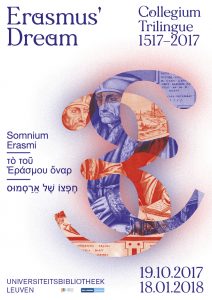Solliciteren kan via www.academictransfer.com/42315:
Job description
We are looking for four researchers (3 PhD candidates and 1 Postdoc researcher) to form the team of the NWO VICI project Citizenship Discourses in the Early Middle Ages (400-1100), granted to dr. Els Rose and running from 2017-2022.
The project as a whole explores how the early medieval world employed citizenship terminology inherited from the classical and biblical past, to shape and give expression to the new social, political and religious identities of Europe’s post-Roman inhabitants. The project examines the radical semantic changes to the use of citizenship terminology in a variety of written sources dating to the period 400-1100 and applies discourse analysis to these sources in order to lay bare their social implications.
A full description of the project is available here:
https://www.uu.nl/en/research/utrecht-centre-for-medieval-studies/research/current-projects
The three PhD researchers will investigate citizenship discourse in the following domains of early medieval culture:
PhD 1 will work on hagiography and apocryphal literature (project P3);
PhD 2 will study liturgy and sermons (project P4);
PhD 3 will examine the role of the Latin language in the process of percolation of citizenship discourse through to all layers of society (project P5);
The Postdoc will concentrate on the legal aspects of citizenship in a Christianising world, both in the centres and the peripheries of the (former) Roman Empire, in urban as well as non-urbanised settings (project P2 shared with the PI; project P6).
Requirements
We are looking for four excellent and enthusiastic researchers who fulfil the following requirements:
For the PhDs:
- Master’s Degree in Medieval, Ancient or Classical Studies or a related field;
- Demonstrable knowledge of Latin and the willingness to specialise in Medieval Latin;
- Excellent communication skills in English, both in written and spoken form;
- Excellent writing skills at an academic level;
- Preparedness and ability to work both as a creative and independent scholar and as part of an academic team;
- Ability to speak or willingness to learn Dutch
For the Postdoc, in addition to the above:
- A completed and approved PhD-thesis in a relevant field of studies;
- Demonstrable knowledge of and experience in researching ancient or medieval legal history is an asset.
Conditions of employment
We offer a position in an ambitious research project, embedded in the rich interdisciplinary tradition of Medieval Studies at Utrecht University. You will carry out one of the sub-projects, in which process you will have the opportunity to choose your own focus and methodological paths, depending on your expertise and choice of sources, all in consultation with the project leader.
You will be based at the Department of Languages, Literature and Communication (TLC) and participate in the Utrecht Centre for Medieval Studies (www.uu.nl/ucms), which co-ordinates the Utrecht medievalists in the Institute for Cultural Inquiry (ICON) and the Research Institute for History and Art History (OGK). Both the department and UCMS provide a stimulating and internationally oriented research environment. As a project member you will take part in the international conferences and other activities the project will initiate. All projects require a limited amount of teaching, which will allow you to build up or extend a teaching record.
We offer
Three PhD-positions at 1.0 fte, starting 1 March 2018, initially for a period of 18 months. Upon good performance and a positive evaluation, the contract will be extended for the remaining 30 months period (4 years in total). The gross monthly salary will start at € 2,222 in the first year and ends at € 2,840 in the fourth, on a full time basis (P-scale of the Collective Employment Agreement Dutch Universities);
and
A Postdoc-position at 1.0 fte, starting 1 March 2018 at the latest, initially for a period of one year. Upon good performance and a positive evaluation, the contract will be extended for the remaining 24 months period (3 years in total). The gross monthly salary ranges between € 3,238 and € 3,605 for a full-time employment, depending on experience and qualifications.
Salaries are supplemented with a holiday bonus of 8% and and a year-end allowance of 8.3% per year. In addition, Utrecht University offers excellent secondary conditions, including an attractive retirement scheme, (partly paid) parental leave and flexible employment conditions (multiple choice model). Here you’ll find more information about working at Utrecht University.
Employer
A better future for everyone. This ambition motivates our scientists in their leading research and inspiring teaching. At Utrecht University, the various disciplines collaborate intensively on major societal themes. Our focus is on Dynamics of Youth, Institutions for Open Societies, Life Sciences and Sustainability.
The Faculty of Humanities has around 6,000 students and 900 staff members. It comprises four knowledge domains: Philosophy and Religious Studies, History and Art History, Media and Culture Studies, and Languages, Literature and Communication. With its research and teaching in these fields, the Faculty aims to contribute to a better understanding of the Netherlands and Europe in a rapidly changing social and cultural context. Enthusiastic and committed faculty members and excellent amenities in the historical city center of Utrecht, where the Faculty is housed, contribute to an inspiring working environment.
Additional information
Are you interested? Click here https://www.uu.nl/en/research/utrecht-centre-for-medieval-studies/research/current-projects for the full project description.
For further information, please contact dr. Els Rose via h.g.e.rose@uu.nl


